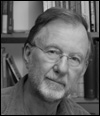Dennis F. Thompson to step down
Founding director of Harvard’s ethics center will leave at end of academic year

The founding director of Harvard’s University-wide ethics center, Alfred North Whitehead Professor of Political Philosophy Dennis F. Thompson, is stepping down at the end of this academic year, after 20 years of leading the institution’s efforts in education and scholarship in ethics.
Thompson was appointed in 1986 by President Derek Bok to institute a program that would improve teaching and research on ethical issues. In 2004, in recognition of a major gift, the program was renamed the Edmond J. Safra Foundation Center for Ethics.
Bok said of Thompson, “Dennis has been an extraordinary leader – not only of the center, but in the field of ethics at Harvard and across the country. It took me eight years to persuade Dennis to join our faculty, and he has more than fulfilled my high expectations in every respect. Under his leadership, the center has transformed teaching and research in ethics at Harvard; we owe him a profound debt of gratitude.”
Bok has begun a search for Thompson’s successor, and is inviting nominations from faculty and others at Harvard and elsewhere.
“No one could ask for a more exciting intellectual life than I have enjoyed at the center,” Thompson commented. “For nearly two decades, I have been privileged to work with the most promising and the most accomplished scholars in ethics from many different disciplines and professions.”
The center brings together advanced graduate students and faculty members from many different disciplines and professional schools, who spend a year at the center as fellows. The center also supports curricular initiatives, a variety of public programs, undergraduate research, and ethics programs in several of the faculties at Harvard.
David Wilkins, Kirkland and Ellis Professor of Law at Harvard Law School and an alumnus of the ethics fellowship program, said of Thompson, “Dennis quite literally put the serious study of ethics within and across professions on the map — not just here at Harvard but in the academy generally. During his tenure as director of the Safra Center, Dennis has mentored dozens of young scholars (myself included)…helping us to connect theoretical insights from philosophy and political theory with professional practice and aspirations…His legacy in the field of ethics will be felt, treasured, and studied for generations to come.”
Under Thompson’s leadership, the center has educated more than 200 fellows from 85 colleges and universities throughout the nation and nearly 20 foreign countries. Fifteen fellows have been appointed to faculty positions at Harvard. Many others have gone on to found ethics programs in their own institutions. The center has supported the creation or revision of some 45 courses in 17 different disciplines in Harvard College. A program of summer research grants for undergraduates working on ethics projects was instituted this year. The center has also assisted in the development of ethics programs at the Medical School, Law School, Business School, Kennedy School, and the schools of Public Health and Education.
Initially supported by the president and the four largest professional schools, the center has raised its own endowment, which now stands at $25 million. In addition to the gift from the Safra Foundation, significant contributions have come from the American Express Foundation, the estates of Lester Kissel and Obert Tanner, and grants from Eugene Beard.
Thompson will continue his teaching in the Government Department and the Kennedy School of Government. He was the senior adviser to the president of the University from 2001 to 2004. Previously he served as associate provost of the University from 1996 to 2001.
Known for his pioneering work in the field of political ethics, Thompson has written widely not only on politics but also other professions. His most recent book is a collection of essays titled “Restoring Responsibility: Ethics in Government, Business, and Healthcare” (Cambridge University Press). Thompson is also a major scholar of democratic theory. His most recent books in this field include: “Just Elections: Creating a Fair Electoral Process in the United States” (University of Chicago Press) and “Why Deliberative Democracy?” (Princeton University Press), co-authored with Amy Gutmann.
Thompson is a fellow of the American Academy of Arts and Sciences and a past president of the American Society of Legal and Political Philosophy. He has served as a consultant to the Joint Ethics Committee of the South African Parliament, the American Medical Association, the Food and Drug Administration, the U.S. Office of Personnel Management, and the Special Counsel of the Senate Ethics Committee.
Thompson took a first-class honors degree in philosophy, politics and economics at Balliol College, Oxford University, in 1964, and received a Ph.D. in political science from Harvard in 1968. He taught at Princeton, where he served as chair of the Politics Department, before returning to Harvard in 1986.




